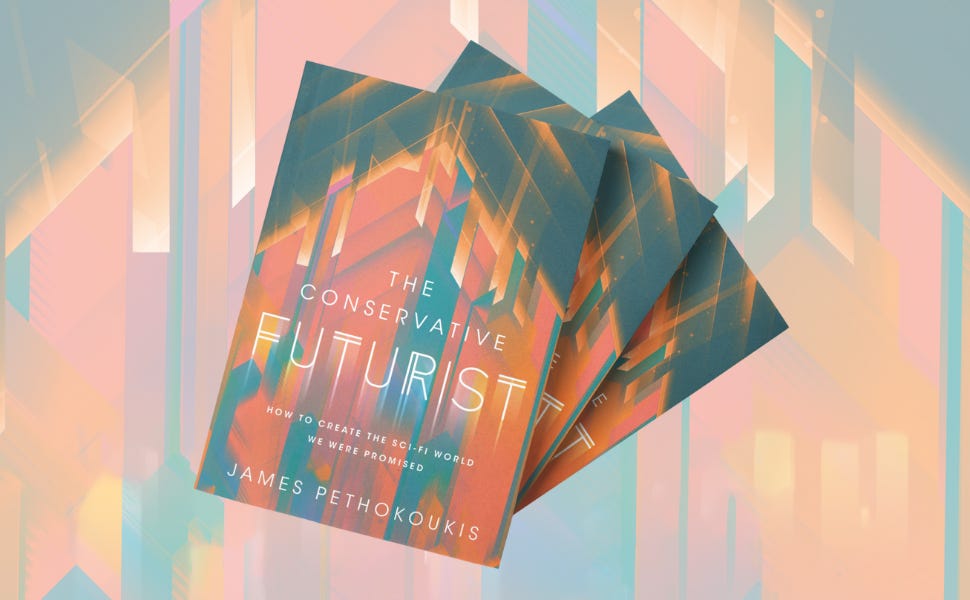⏸ What the printing press and stagnation in the Islamic world teach about AI
There's nothing new about caution, apathy, and ignorance regarding an emerging technology
Quote of the Issue
“If another Messiah were born, he could hardly do so much good as the printing-press.” - Georg Christoph Lichtenberg
I have a book out: The Conservative Futurist: How To Create the Sci-Fi World We Were Promised is currently available pretty much everywhere. I’m very excited about it! Let’s gooooo! ⏩🆙↗⤴📈
The Essay
⏸ What the printing press and stagnation in the Islamic world teach about AI
One of the classic cautionary tales of Down Wing technological rejectionism is the story of the Ottoman Empire and the movable-type printing press. Although Johannes Gutenberg invented the press around 1450 and the Ottomans knew about it as early as the 1480s, the Ottomans suppressed the press for some 250 years. It’s a story that was referenced at an international conference on Tuesday by the UAE’s Minister of State for Artificial Intelligence, Omar Al Olama. As Fortune reports:
“We over-regulated a technology, which was the printing press,” said Al Olama. “It was adopted everywhere on Earth. The Middle East banned it for 200 years. “The calligraphers came to the sultan and said: ‘We’re going to lose our jobs, do something to protect us’—so job loss protection, very similar to AI,” the UAE minister explained. “The religious scholars said people are going to print fake versions of the Quran and corrupt society—misinformation, second reason.” Lastly Al Olama said it was the fear of the unknown that led to this fateful decision. “The top advisors of the sultan said: ‘We actually do not know what this technology is going to do, let us ban it, see what happens to other societies and then reconsider,’” he explained.
The missed opportunity that changed world history
The point being made here: Just as the repudiation of the printing press meant, in effect, stagnation in math and science and the forfeiting the Islamic world’s position a leading center of culture, repudiating AI would be similarly disastrous today for the Arab world. As Jared Rubin writes in Rulers, Religion, and Riches: Why the West Got Rich and the Middle East Did Not, “The Ottomans’ failure to adopt the printing press is one of the great missed opportunities of economic and technological history. In Western Europe, the press provided a host of new economic and educational opportunities that were simply unthinkable prior to the press.”
According to Rubin, the Ottomans' initial encounter with the printing press occurred during Sultan Bayezid II's reign (1481–1512). A somewhat controversial historical account suggests that he, in 1485, and his successor, Selim I, in 1515, issued edicts banning the use of printing presses for Ottoman Turkish and Arabic scripts, under penalty of death. This prohibition primarily targeted Muslim subjects, as religious minorities were permitted to print non-Islamic material in other scripts. (Jewish immigrants from Spain and Portugal established a Hebrew press in Istanbul in 1493, followed by Armenians in the 1560s using the Armenian alphabet, and a Greek Orthodox monk introducing a Greek press in 1627.) The restriction was significantly relaxed in 1727, Rubin continues, when Ahmed III allowed Ibrahim Müteferrika, a Hungarian Muslim convert, and his partner Sa’id Efendi, to print non-religious works in Arabic script. Their press, operating until 1745, produced practical works like maps, grammar books, and dictionaries but only published seventeen works in total.
Rubin:
It was clear that the sultan was lifting a major restriction. The edict stated that the new technology would be “unveiled like a bride and will not again be hidden.” This suggests that the original edicts played some role in suppressing printing in the Arabic script in the intervening two and a half centuries between their original imposition and the explicit permission to establish a press granted in the early eighteenth century.
What drove the restriction on the printing press?
Now as Rubin explains it, the Ottoman Empire's religious elite — fearing the printing press would weaken their control over knowledge dissemination and thus their societal influence — persuaded the sultan to ban it, thus maintaining the legitimacy of religious authorities. (In contrast, Christian leaders in Europe couldn't exert similar influence, allowing the press to spread rapidly there.) He stresses that there's nothing inherently anti-commerce in Islam. Early Islamic doctrines were adaptable and supported growth, making the Middle East a leader in various fields for centuries.
Over time, however, the intertwining of religious and political authority hindered economic progress. Rubin: “Religious doctrines such as those banning interest or reproducing words and images, which were not a problem in the premodern economy, came to the fore as an impediment to overcome.”
That said, I think a complementary theory by Anton Howes, a historian of innovation, is also pretty interesting and has a lot of applicability to our current situation with AI. Howes argues that setting up an Arabic-script printing press was far more expensive than in Europe, due to the larger number of types required for the cursive script. This meant presses needed extra support. In Europe, funding came from a range of sources, including bishops, monasteries, merchants, and rulers granting monopolies. But in the Ottoman Empire, only the sultan had the resources to fund the major upfront costs.
Howe:
There was not, then, necessarily any particular obstacle to the introduction of Arabic-character printing presses to the Ottoman Empire. It’s just that, given the much higher costs involved in both establishing and running them, it really needed an active interest from the Sultan. He was the one person able to afford the up-front costs and commercial risks, which in western Europe could otherwise be borne by a much broader group of elites, among whom would-be printers could expect to find at least a handful of interested people to become patrons. The reason for the non-adoption of the printing press in the empire may thus have been as simple as apathy, which was only overcome in the 1720s when Müteferrika forcefully made the case for printing’s benefits. … The Müteferrika press of the 1720s was, after all, the state’s official press, set up with the explicit backing of the Sultan and funded by his grand vizier.
So, according to Howe, some combination of caution, apathy, and ignorance delayed the printing press and helped the West take a technological and economic lead that persists to this day. And it is those same factors — caution, apathy, and ignorance — that could hamper efforts to technologically advance and economically integrate AI in rich countries such as the United States. Policymakers, I fear, don’t fully recognize or understand the potential upsides of AI, while obsessing over potential downsides, including science fictional ones .
Technology and trade-offs
I mean, there will always be trade-offs with new technologies. That includes the printing press. Look, Gutenberg’s press is widely considered to be one of the most important technologies in history. In The Discoverers: A History of Man's Search to Know His World and Himself, historian Daniel J. Boorstin calls “it one of the crucial inventions— along with the clock, the compass, the telescope, and the microscope, the printing press and movable type—which have been essential instruments of discovery” through its “power to open the world and diffuse knowledge of discoveries in convenient packages.”
But even the printing press had its downsides, as Boorstin notes. Even as the Age of Exploration was uncovering the true geography our our planet, old ideas gained new life:
Printing presses in those days before copyright made it easy for Ptolemy’s ideas to be widely diffused at the very time when many of them were being proved wrong. For example, even after Dias and Gama had demonstrated that ships could sail around Africa and that the Indian Ocean was an open sea, Ptolemy’s maps continued to show the Indian Ocean as a land-bound lake, an Asian Mediterranean. Sometimes in the very same volumes that depicted the exploits of Dias and Gama. In this way the power of print was emphatically conservative. Ars artium omnium conservatrix (The art preservative of all arts) were the words inscribed in the mid-sixteenth century on the house of Laurens Janszoon Coster, whom some Dutch scholars credit with the invention of printing. And the press had a new power to conserve obsolete ideas.
Nothing new about misinformation. Nothing new about bad ideas gaining currency via new information technology. And nothing new about elites fearing the disruptive potential of new technologies.
Micro Reads
▶ Third-Country Effects of U.S. Immigration Policy - Agostina Brinatti and Xing Guo, Bank of Canada |
▶ What We Need to Talk About When We Talk About AI - Dave Lee, Bloomberg Opinion |
▶ The ‘AI doomers’ have lost this battle - Benedict Evans, FT |
▶ The militarized AI risk that’s bigger than “killer robots” - Jeffrey Lewis, Vox |
▶ Crystal-hunting DeepMind AI could help discover new wonder materials - Alex Wilkins, New Scientist |
▶ Google DeepMind's AI Dreamed Up 380,000 New Materials. The Next Challenge Is Making Them - Gregory Barber, WIRED |
▶ JPMorgan Says AI Technology Is Starting to Generate Revenue - Katherine Doherty, Bloomberg |
▶ G.M. to Cut Spending on Cruise Self-Driving Unit - Neal E. Boudette and Yiwen Lu, NYT |
▶ The US retains the economic advantage in its rivalry with China - Martin Wolf, FT Opinion |
▶ The X Prize is taking aim at aging with a new $101 million award - Cassandra Willyard, MIT Technology Review |
▶ A new kind of solar cell is coming: is it the future of green energy? - Mark Peplow, nature |
▶ Solar geoengineering is becoming a respectable idea - The Economist |
▶ A New Type of Geothermal Power Plant Just Made the Internet a Little Greener - Gregory Barber, WIRED |
▶ A new way to estimate our maximum lifespan could help us extend it - Michael Le Page, New Scientist |
▶Could a Drug Give Your Pet More Dog Years?- Emily Anthes, NYT |







I mean, maybe the potential dangers of the printing press weren't quite so existential? https://open.substack.com/pub/unchartedterritories/p/openai-and-the-biggest-threat-in?utm_source=share&utm_medium=android&r=9fely not saying stop everything, but caution is surely warranted here?
I know that this is a little off topic, but if anyone is interested in a reading a summary of the book James mentioned in this post, you can find one at my online library of book summaries:
https://techratchet.com/2021/03/29/book-summary-rulers-religion-and-riches-by-jared-rubin/